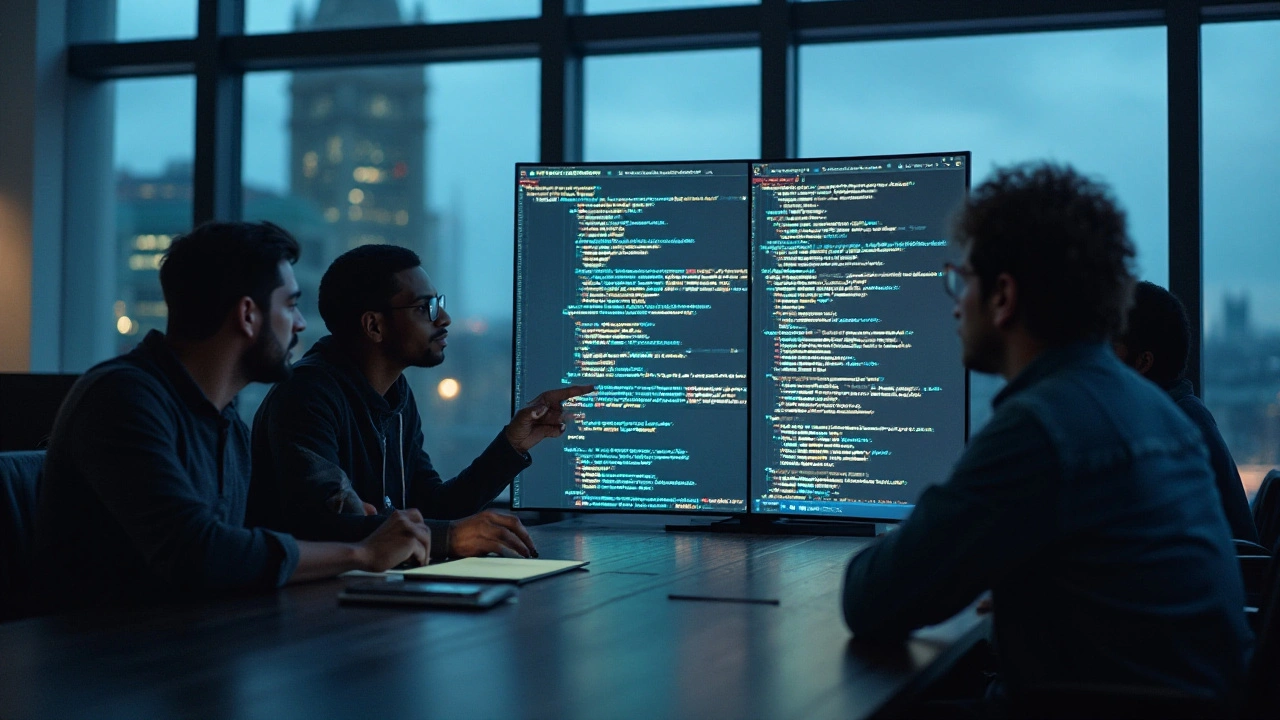In the realm of programming, the ability to debug code effectively is more than just a useful skill—it's essential. Whether you're a novice or a seasoned coder, encountering bugs is an inevitable part of the development journey. But what sets great programmers apart is how they approach these challenges.
This guide dives into the art of code debugging, equipping you with strategies and insights to not only find but understand and fix errors swiftly. We'll explore some of the most common tools you need in your toolkit, along with techniques that enhance your ability to streamline your code and polish your projects to perfection.
From examining real-world debugging scenarios to sharing top tips on cultivating these skills, this article aims to transform the way you tackle programming errors. Get ready to step up your debugging game and, in turn, produce cleaner, more efficient code that you're proud to share with the world.
- Understanding Debugging
- Common Tools and Techniques
- Real-World Debugging Scenarios
- Tips for Becoming a Pro
Understanding Debugging
Debugging is the backbone of successful code debugging and often separates the proficient programmers from the struggling ones. At its core, it's the intricate process of discovering and resolving errors or bugs within a program, ensuring the software runs smoothly and as intended. While writing code can sometimes seem like an art, debugging hones the craft by adding layers of logical problem-solving and sharp attention to detail. It's a critical skill that allows developers to root out mistakes that can cause programs to crash or behave unexpectedly.
The debugging process usually starts with identifying the existence of a bug, followed by isolating the cause, and then applying the fix, all while ensuring that the solution doesn't create new problems down the line. Debugging often requires a deep dive into the codebase and an intimate understanding of both the language it's written in and the logical flow of the application. This methodical approach can significantly enhance a programmer's ability to write better code in the future. Notably, the term "bug" itself dates back to 1947 when a moth was found in the Mark II computer, and 'debugging' became the term for fixing issues.
An essential skill in debugging is understanding common sources of errors. These could be due to syntax errors, logical mistakes, or issues arising from incorrect assumptions about how the code behaves in different scenarios. Another aspect of effective debugging is the ability to reproduce the issue consistently. Reproducibility allows programmers to test the effects of their fixes methodically. It can sometimes emerge, albeit counterintuitively, that the process of debugging can lead not only to a solution but to a rewriting or significant enhancement of the original code.
As Albert Einstein once remarked, "Most of the fundamental ideas of science are essentially simple, and may be expressed in a language comprehensible to everyone." This holds true for debugging. It's about breaking down the problem into smaller, understandable pieces and solving each one progressively. Many experienced programmers deploy debugging tools like debuggers, which help step through the code and examine variable states at different execution points. Such tools can be vital for providing insights that are otherwise impossible to glean on a quick pass-through.
“Debugging is like being the detective in a crime movie where you are also the murderer.” – Filipe Fortes
Lastly, the human element in debugging cannot be overstated. It's both a mentally taxing and rewarding process, requiring patience, persistence, and sometimes a willingness to ask for help or a fresh pair of eyes. By understanding and mastering the art of debugging, developers not only optimize their own processes but also elevate the entire field of software development, driving better error resolution across myriad applications.

Common Tools and Techniques
When diving into the realm of code debugging, it's crucial to arm oneself with the right tools and techniques. Many programmers find that identifying errors becomes exponentially easier when equipped with debugging software designed to illuminate the often mystifying puzzles that code can present. Debugging tools not only highlight where a code error might exist, but also provide insights into the underlying causes of these disruptions in the coding flow. Tools like GDB, Visual Studio Debugger, and Xcode have become staples, offering a range of features that include breakpoints, watch variables, and real-time inspection of code execution. These capabilities allow developers to pause code execution at critical points, observe variables as they change, and diagnose where things may have gone awry. Mastering these tools is often said to save hours, if not days, of headache during the development process.
An effective technique often complements these tools. While each developer may find their method, some common approaches tend to work across diverse sets of problems. For instance, the divide-and-conquer approach lets a programmer focus on smaller, manageable code sections to isolate a bug. Testing incrementally is also recommended; testing code frequently as you write it helps catch issues early. By adopting a consistent approach to testing, such as writing tests for each function or module, developers can confidently identify where a fault lies when an unexpected behavior emerges. Additionally, extensive logging and print statements serve as cheap yet effective means for diagnosing issues, especially within code sections not easily monitored by a debugger. They reveal the story of code execution, capturing data points crucial in understanding the context of a problem.
Another important aspect is understanding and leveraging programming community insights. Engaging with communities such as Stack Overflow or GitHub Discussions can be invaluable. These platforms provide a treasure trove of knowledge, from shared solutions to coders' collective wisdom on resolving tricky bugs. As developer Conan Doyle famously stated, "Debugging is like being the detective in a crime drama where you are also the murderer."
Debugging is an introspective process, much like an internal conversation between the coder and the code, where understanding nuances leads to resolving conundrums.This quote captures the essence of approaching code debugging strategically. The art and science of debugging lie in one’s ability to understand not just the surface errors but also the deeper logic lapses that create them in the first place.
Programmers must also remain adaptable, constantly updating their repertoire of techniques to include newer methods that emerge as software development evolves. For instance, using version control systems can aid debugging efforts by allowing programmers to roll back to earlier code versions, effectively freezing the code at a known-good state and providing a clear trail of changes. This 'time machine' approach helps in tracing when and where an error materialized. By maintaining such practices, developers create a comprehensive safety net, ensuring every angle is considered when hunting elusive bugs. With tools and techniques finely tuned, the programmer is not just a passive troubleshooter but a proactive solver with a strategic approach to coding challenges.

Real-World Debugging Scenarios
When it comes to working through code debugging challenges, real-world scenarios provide some of the best learning experiences for programmers. Imagine working on a complex web application where a critical feature inexplicably fails during its demonstration. This setback isn't just daunting but needs a swift resolution to avoid jeopardizing project deadlines. The first crucial step in tackling such scenarios is to meticulously trace the bug back to its source. Programmers often take every detail into account, systematically ruling out possibilities. Everything from recent code updates to environmental changes gets scrutinized closely.
A particular real-life debugging case involved a major tech company launching a new user interface that started behaving unexpectedly after a routine maintenance update. After extensive investigation, it was discovered that a missing semicolon had caused a cascade of UI failures. This simple oversight that slipped through the cracks during review stages gave teams valuable lessons about the importance of effective code linting and testing. Thorough testing, in diverse environments, is often emphasized to prevent such occurrences. Reliable debugging tools such as Chrome DevTools or Python's PDB are pivotal in examining the inner workings of code step-by-step, offering valuable insights into the mystery at hand.
"Programs must be written for people to read, and only incidentally for machines to execute." - Harold Abelson
Real-world debugging isn't limited to syntax errors; it also involves complex logical errors and performance bottlenecks. Picture a scenario where an eCommerce website has a slow checkout process. Even though the code appears free of obvious bugs, users experience frustration from delays. In this instance, developers employ profiling tools to pinpoint performance issues, a vital step in modern-day debugging. They might discover that some inefficient loops or numerous non-essential API calls are dragging down performance. Once pinpointed, the debugging process becomes a chance to optimize, refactor, and sometimes even rewrite portions of the code to enhance efficiency.
Another true-to-life situation could involve internationalization errors, where a localization feature breaks due to unforeseen data formats or linguistic nuances, causing the software to crash only in specific regions. Here, understanding the intricacies of the target language and locale is imperative. Often, such errors are resolved by integrating comprehensive checks and balances tailored for diverse user demographics. Debugging these scenarios highlights the importance of cultural and contextual awareness in development—a factor often underestimated in the current global tech environment.
Learning through these scenarios helps developers better appreciate the complexities and nuances of software behavior. They may resort to documentation, community forums, or developer meetups to share insights and glean knowledge from similar past experiences. Sometimes even a direct consult with more experienced peers can unveil the most elusive error. Usually, an informal yet powerful peer code review session serves as both a debugging tool and a chance for mutual learning. In a world increasingly reliant on software, understanding and mastering these programming tips and strategies isn't just encouraged—it's indispensable for improving overall code quality and bringing innovative ideas to fruition.

Tips for Becoming a Pro
Developing your expertise in code debugging starts with cultivating a mindset that eagerly welcomes challenges as learning opportunities. First and foremost, nurturing a curious nature goes a long way in unraveling intricate coding puzzles. When faced with a bug, don't see it as a roadblock but a stepping stone toward mastery. Dive deeply into understanding every aspect of the issue—ask why a piece isn't working as intended rather than just finding how to skirt around it. Reflecting on each debugging session helps to recognize patterns over time, leading to quicker resolutions in the future. As Albert Einstein famously said,
"The important thing is not to stop questioning. Curiosity has its own reason for existing."Cultivating a curious and analytical approach is key to success.
Another effective strategy is enhancing your debugging toolkit. Leverage different debugging tools that suit various contexts and coding languages. Tools like GDB for C/C++, PyCharm for Python, and the browser's own developer tools for web development are indispensable in speeding up the debugging process. It is important to not just use these tools but to truly understand their capabilities. Spending time learning how to navigate and fully utilize these resources can be a game-changer. Many developers find significant productivity boosts by integrating IDEs with built-in debugging capabilities, allowing for precise breakpoints, step execution, and variable inspection. Documentation and user forums are excellent opportunities to learn advanced functionalities of these tools which might not be apparent at first glance.
Communication often plays a surprisingly critical role in debugging success. Programmers frequently work in teams, and articulating the bug and its implications clearly can lead to faster resolutions. Pair programming or simply discussing the problem with a peer can yield fresh perspectives that may not be apparent when working solo. Sometimes, just explaining the problem out loud to someone else can bring about an "aha" moment. Partaking in programming communities, like Stack Overflow or GitHub Discussions, not only helps in seeking solutions but also in contributing knowledge. Engaging with fellow coders increases your exposure to varied debugging approaches and coding practices.
Staying updated with recent trends and advancements in software development can also bolster your debugging prowess. Following technology blogs, subscribing to programming podcasts, or attending webinars keeps you informed of novel tools, techniques, and best practices employed in modern debugging. With the field of software development being perpetually evolving, it's essential to prioritize continuous learning and adaptability. To offer some perspective, a survey conducted by Stack Overflow in 2023 revealed that about 90% of developers believed regularly learning and adapting to new tools make them more proficient in debugging tasks.
Lastly, fostering a patient and zen-like attitude toward coding errors can significantly impact your overall productivity. Debugging can be intensely frustrating, but it is this tenacity that turns perplexing issues into mere stepping stones of success. Building error-free software doesn't occur in a vacuum; it's a continuous journey of attempting, failing, learning, and eventually excelling. Developing the mindset that every bug resolved is another feather in your cap will help you transform into a debugging maestro over time.

